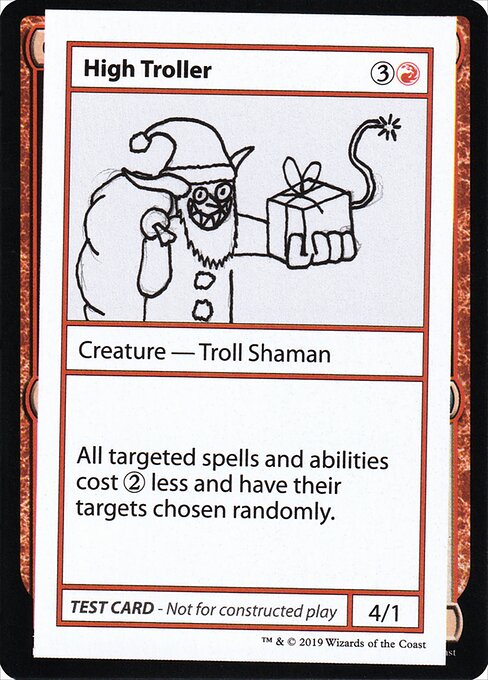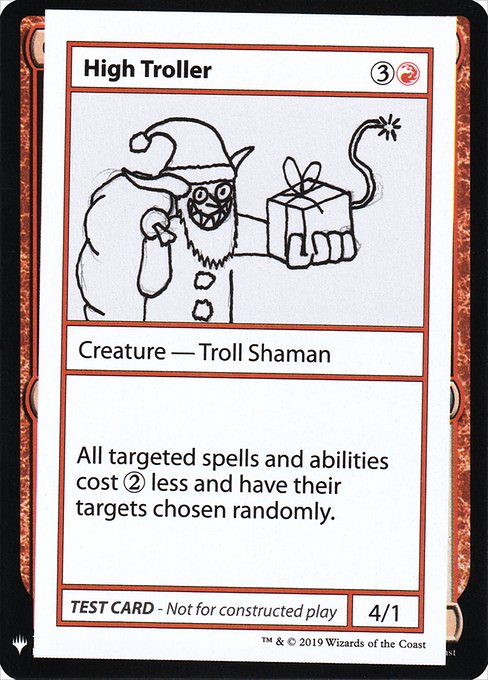standard
future
historic
gladiator
pioneer
explorer
modern
legacy
pauper
vintage
penny
commander
brawl
alchemy
paupercommander
duel
oldschool
premodern
Rulings
A spell or ability is targeted if it has one or more targets.
If a spell or ability has two or more targets where the legality of one or more of those targets depends on what one or more of the other targets are, the targets are chosen at random in the order specified on the card. If choosing one player or object as a target would cause no legal targets to remain for another target, that player or object can’t be randomly chosen.
Targets are chosen only from among legal targets.
Targeted spells and abilities cost only less, even if they have more than one target.
One a spell or ability has had random targets chosen, a player can’t choose to not finish casting or activating that spell or ability unless there’s no way for the player to complete the process. For example, the player can’t choose to not activate mana abilities to pay for the spell.
If a spell or ability has “any number” of targets or “up to” a given number of targets, first its controller choses how many targets it has. If that number is greater than zero, the targets are chosen randomly.
A triggered ability won’t cost less, since there isn’t a triggering cost to reduce, but its targets will be chosen randomly.
If a spell or ability has two or more targets where the legality of one or more of those targets depends on what one or more of the other targets are, the targets are chosen at random in the order specified on the card. If choosing one player or object as a target would cause no legal targets to remain for another target, that player or object can’t be randomly chosen.
Targets are chosen only from among legal targets.
Targeted spells and abilities cost only less, even if they have more than one target.
One a spell or ability has had random targets chosen, a player can’t choose to not finish casting or activating that spell or ability unless there’s no way for the player to complete the process. For example, the player can’t choose to not activate mana abilities to pay for the spell.
If a spell or ability has “any number” of targets or “up to” a given number of targets, first its controller choses how many targets it has. If that number is greater than zero, the targets are chosen randomly.
A triggered ability won’t cost less, since there isn’t a triggering cost to reduce, but its targets will be chosen randomly.
Rulings
A spell or ability is targeted if it has one or more targets.
If a spell or ability has two or more targets where the legality of one or more of those targets depends on what one or more of the other targets are, the targets are chosen at random in the order specified on the card. If choosing one player or object as a target would cause no legal targets to remain for another target, that player or object can’t be randomly chosen.
Targets are chosen only from among legal targets.
Targeted spells and abilities cost only less, even if they have more than one target.
One a spell or ability has had random targets chosen, a player can’t choose to not finish casting or activating that spell or ability unless there’s no way for the player to complete the process. For example, the player can’t choose to not activate mana abilities to pay for the spell.
If a spell or ability has “any number” of targets or “up to” a given number of targets, first its controller choses how many targets it has. If that number is greater than zero, the targets are chosen randomly.
A triggered ability won’t cost less, since there isn’t a triggering cost to reduce, but its targets will be chosen randomly.
If a spell or ability has two or more targets where the legality of one or more of those targets depends on what one or more of the other targets are, the targets are chosen at random in the order specified on the card. If choosing one player or object as a target would cause no legal targets to remain for another target, that player or object can’t be randomly chosen.
Targets are chosen only from among legal targets.
Targeted spells and abilities cost only less, even if they have more than one target.
One a spell or ability has had random targets chosen, a player can’t choose to not finish casting or activating that spell or ability unless there’s no way for the player to complete the process. For example, the player can’t choose to not activate mana abilities to pay for the spell.
If a spell or ability has “any number” of targets or “up to” a given number of targets, first its controller choses how many targets it has. If that number is greater than zero, the targets are chosen randomly.
A triggered ability won’t cost less, since there isn’t a triggering cost to reduce, but its targets will be chosen randomly.
Your collection? Your decks?
Want to manage your collection and/or create decks?



 0
0
 0.24€
0.24€